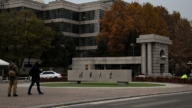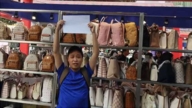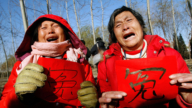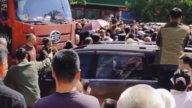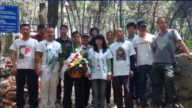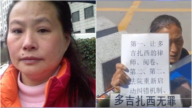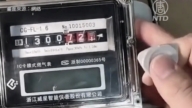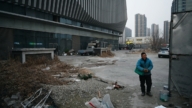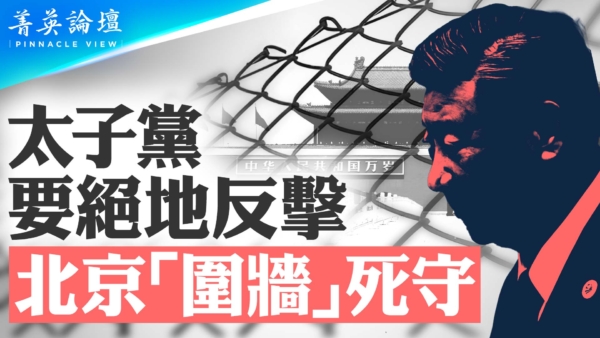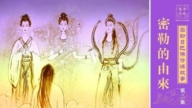【新唐人2013年03月13日讯】中国大陆持续发生地方官员私自租售村民的集体土地,中饱私囊等贪污腐败问题。广东省揭西县上浦村自今年2月开始,村民因抗议村委会官员涉嫌腐败,而发起集体示威,却遭到当局暴力镇压。另一方面,官方媒体上,每天刊登中共领导人习近平有关“老虎苍蝇一起打”的反腐口号,却不见上浦村民被镇压的只字词组。
3月10号凌晨,广东揭阳市揭西县棉湖镇政府出动上千名的武警、上百辆警车和强力吊车,突袭上浦村,先切断全村电源,再施放大量催泪弹,防暴警察见人就打。事件造成约十辆车被烧毁,数十名村民受伤住院,其中多人重伤。
广东政法委周日发出微博表示,已拘捕原村委负责人李宝玉等十人。正追捕涉嫌恶势力头目吴桂存等21人。原村委签订的土地承包合同已被揭西法院裁定撤销﹔棉湖镇委书记和镇长被免职。
一位年轻村民对媒体说:10号当天防暴警察一句话都没说,就开始发射催泪弹,并以棍棒殴打村民。村民们敲锣示警,数百村民冲出去帮助遭殴打的人,但遭到约3000名安全人员逐退。
目前互联网微博上输入“上浦村”或“揭西县”,都无法获得任何搜索结果,显示﹕上浦村反抗征地又成为另一个被禁止议论的话题。
据了解,上浦村村民因不满官商勾结贱卖村里的近500亩田地,自今年2月22号开始,村民占领村广场示威,指称当地官员出卖土地涉嫌腐败,并要求选出新的村委会负责人。
2月24号,当地官员雇佣“黑社会人士”清场,但遭到抗议村民的反抗,现场一片混乱,有大约30辆车被砸。警方逮捕了多名抗议村民,并包围了上浦村。村民则在村内设立路障,阻挡警察进入村内。双方对峙了数周。
时政评论家蓝述表示,现在中共北京的两会还没有完全结束,领导人口中信誓旦旦、响亮的反腐改革口号声言犹在耳,但是广东这边却出现了暴力镇压的维权事件。
时政评论家蓝述:“村民的要求民主、要求惩治这些村官的贪污腐败的行为,这东西本来村民的要求,是和中共第五代接班以后,在过去几个月里面所释放出来的信息是非常一致的,可是呢,他们(中共)不但没有按照以前的乌坎事件那样进行处理,相反的是出现暴力镇压、暴力执法的事情,这是一个很让人疑惑的信号。”
有媒体表示,胡春华主政广东之后,各界都对这个中共第六代的明日之星寄予厚望,希望他能拨乱反正,在农村基层乱象中寻找出一条根本解决之道,但没想到胡春华仍然以武力镇压为手段,与民意背道而驰。
时政评论家蓝述:“这件事情它所释放出来的信号,和前一段时间北京释放出来的,所有的停止劳改制度,或者是要进行改革等等这一切信号,完完全全是背道而驰的,会让外界对北京未来的走向,多打很多个问号,这个是非常令国际社会感到疑惑的一件事情。”
网友“广州角落”说,村民对政府的行为很失望,村民难以忘记凌晨的暴行,村民忍着疼痛呼喊着,村民呻吟着。村民永远记得2013年3月10日凌晨。
北京宪政学者陈永苗:“所以他说要改革,也是嘴巴说说,那改变不了它(中共)运转的机制,例如地方财政需要依赖于这个征地,抢夺农民的地,这一点是永远不会变的。”
网友阿智说,看到那些血肉模糊的照片眼泪都快涌出来了。我爱我的祖国,但我讨厌我们的政府!半夜三更一群人手拿盾牌和警棍,还扔催泪弹,扫荡了整个村子,你们和当年鬼子进村有什么区别吗?
采访/刘惠 编辑/黄亿美 后制/郭敬
Ordinary Citizens in China Protect Themselves
Local officials continue to profit from illegally, and privately
selling land collectively owned by villagers in China.
In February 2013, villagers from Shang Pu Village,
Guangdong Province, protested against suspected
corruption of village committee officials.
This led to a collective demonstration, but local
authorities quickly responded with a violent crackdown.
There was also a media silence over the incident.
However, official media did published reports on Xi Jinping’s
‘beating tigers and flies together’ anti-corruption slogans.
On March 10, the local government of Jieyang City,
Guangdong Province dispatched over a thousand
armed police, as well as hundreds of police cars
and powerful cranes, to attack Shang Pu Village.
They cut off the power supply to the village
first, and then threw many tear gas bombs.
Ten vehicles were burned, dozens of villagers were
hospitalized, with many of them seriously injured.
The former director of the village committee
disclosed that 21 people were hunted down.
This included leader Wu Guichung,
who maintained a microblog.
Land contracts signed by the former village
committee were revoked by Jiexi Court.
The Town Committee secretary and
the Mayor were removed from office.
A young villager told the media that on
March 10, riot police did not say a word.
They began to fire tear gas and beat villagers with clubs.
Villagers sounded a warning gong and
hundreds of them rushed out to help the victims.
They were chased away by 3,000 security guards.
Currently, one cannot find Shang Pu
Village or Jiexi City on Internet searches.
Shang Pu Village’s protests over illegal land
acquisition has become another forbidden topic.
It is reported villagers were unhappy about government
officials cheaply buying nearly 500 acres of land.
On February 22 2013, villagers occupied
the village square to demonstrate.
They accused local officials of corruption regarding the land
sales, and asked to elect a director of the village committee.
On February 24, local officials hired local thugs to clear
the village square, which met resistance from villagers.
About 30 police vehicles were damaged
and many villagers were arrested.
Meanwhile, villagers set up roadblocks
to block the police from entering.
The confrontation lasted for a few weeks.
Lan Shu, political commentator said that
the two sessions was not yet finished.
The leaders’ vows and slogans for
anti-corruption are still ringing in our ears.
In Guangdong, violent repression
of human rights has just arisen.
Lan Shu: “Villagers demanded democracy and
the punishment of local officials’ corruption.
Their requests were in accordance with
the messages from their new leaders.
However, the Chinese Communist Party
(CCP) reacted with violent suppression.
That is a puzzling signal for the Chinese people.”
Media reported that since Hu Chunhua ruled
Guangdong, people from all walks of life held
high hopes that he could bring order out of chaos.
In contrast to public opinion, he chose suppression by force.
Lan Shu: “This incident signals the opposite of previous
reforms, including calls for an end to forced labor camps.
Now, the international community is questioning the future
direction of Beijing, and are very puzzled by this incident.
One netizen said that illagers are very
disappointed with the local government.
They will not forget the atrocities of that
morning, and they endured the pain and cried.
Villagers will always remember
the morning of March 10, 2013.
Chen Yongmiao, Beijing constitutional scholar:
“They talked about reform, but words
alone cannot change the CCP system.
For example, the local government
revenue relies on land acquisition.
Thus, the robbing of land from
farmers will remain unchanged.”
Another netizen commented that seeing photos
of those bloody scenes, their tears almost ran down.
They said that they love their
country, but hate the government.
In the middle of the night, they held
shields and batons, and threw tear gas.
Were they any different from the Japanese
invading China during World War II?


